Stéphane Mallarmé
Selected Poems
With illustrations by Odilon Redon (France, 1840 - 1916)
Translated by A. S. Kline © Copyright 2004-2009 All Rights Reserved
This work may be freely reproduced, stored and transmitted, electronically or otherwise, for any non-commercial purpose. Conditions and Exceptions apply.
Contents
- About this Work
- A Toast
- Futile Petition
- A Negress
- Distress
- Summer Sadness
- The Clown Chastised
- The Poem’s Gift
- L’Apres-midi d’un Faune
- Funeral Libation (At Gautier’s Tomb)
- The Tomb of Edgar Allan Poe
- The Tomb of Charles Baudelaire
- Tomb (Of Verlaine)
- Prose
- A Fan
- Another Fan
- Album Leaf
- Note
- Little Air
- Sonnet: ‘Quand l’ombre menaça…’
- Sonnet: ‘Le vierge, le vivace…’
- Sonnet: ‘Victorieusement fui le suicide…’
- Sonnet: ‘Ses purs ongles très haut…’
- Sonnet: ‘Pour votre chère morte, son ami…’
- To The Sole Concern
- All Summarised The Soul…
- What Silk…
- To Introduce Myself…
- Crushed by….
- My Books…
- Sigh
- Homage
- …Mysticis umbraculis
- Fan
- O so dear
- Sonnet
- Autumn Plaint
- Sea Breeze
- About the Author
- Index of First Lines
About this Work
These translations of Mallarmé’s major poetry reflect his position as a leading Symbolist poet of the nineteenth century. His use of complex syntax, and subtle turns of phrase, often makes his verse seem more abstruse than its content indicates, revealing as it does a relatively narrow though sophisticated world, predominantly literary and philosophical in nature. Part of the charm of his poetry is his ability to create a rich and detailed edifice from the simplest of ideas, objects, or occasions. Philosophically he is associated with ideas of absence and emptiness, but also of a quasi-Platonic realm of forms inherent in that emptiness, though paradoxically his verse, which often attempts to realise the ideal essence of the perceived external reality, through its images, symbols, and metaphors, appeals strongly to the senses. The impression is therefore given of a gleaming fin-de-siècle void, the gleam indeed strongly related to the world of Impressionist painting, the void partly a consequence of the earlier poetry of Baudelaire and Rimbaud with its analysis of the emptiness and frustrations of modern life, and partly derived from his own experience and thought.
A Toast
Nothing, this foam, virgin verse
Depicting the chalice alone:
Far off a band of Sirens drown
Many of them head first.
We sail, O my various
Friends, I already at the stern,
You at the lavish prow that churns
The lightning’s and the winters’ flood:
A sweet intoxication urges me
Despite pitching, tossing, fearlessly
To offer this toast while standing
Solitude, reef, and starry veil
To whatever’s worthy of knowing
The white anxiety of our sail.
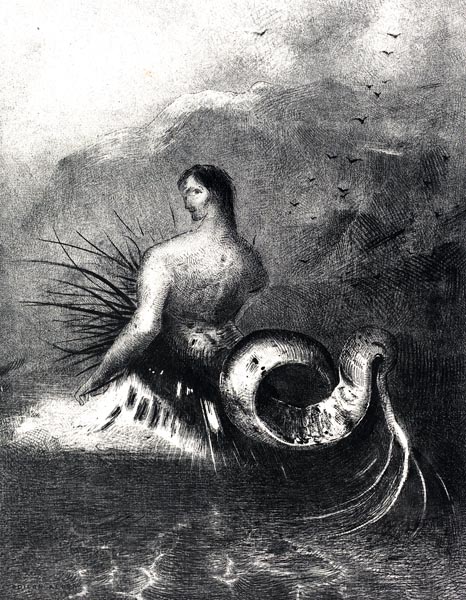
‘The Siren clothed in barbs, emerged from the waves’
Odilon Redon (French, 1840 – 1916)
National Gallery of Art | NGA Images
Futile Petition
Princess! In jealousy of a Hebe’s fate
Rising over this cup at your lips’ kisses,
I spend my fires with the slender rank of prelate
And won’t even figure naked on Sèvres dishes.
Since I’m not your pampered poodle,
Pastille, rouge or sentimental game
And know your shuttered glance at me too well,
Blonde whose hairdressers have goldsmiths’ names!
Name me…you whose laughters strawberry-crammed
Are mingling with a flock of docile lambs
Everywhere grazing vows bleating joy the while,
Name me…so that Love winged with a fan
Paints me there, lulling the fold, flute in hand,
Princess, name me the shepherd of your smiles.
A Negress
Possessed by some demon now a negress
Would taste a girl-child saddened by strange fruits
Forbidden ones too under the ragged dress,
This glutton’s ready to try a trick or two:
To her belly she twins two fortunate tits
And, so high that no hand knows how to seize her,
Thrusts the dark shock of her booted legs
Just like a tongue unskilled in pleasure.
Facing the timorous nakedness of the gazelle
That trembles, on her back like an elephant gone wild,
Waiting upside down, she keenly admires herself,
Laughing with her bared teeth at the child:
And, between her legs where the victim’s couched,
Raising the black flesh split beneath its mane,
Advances the palate of that alien mouth
Pale, rosy as a shell from the Spanish Main.
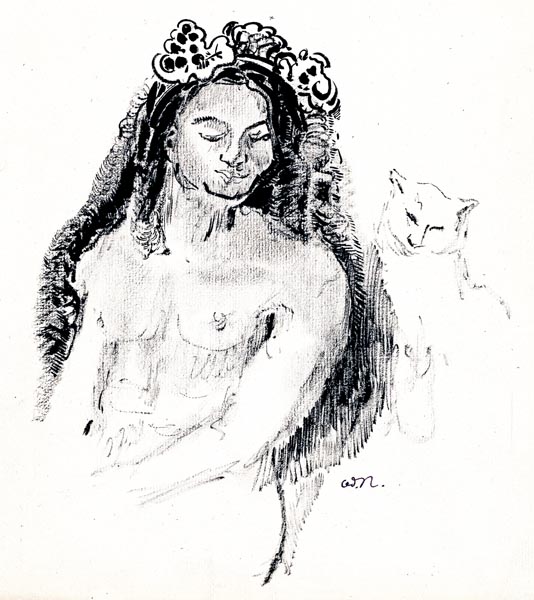
‘The Queen of Sheba’
Odilon Redon (French, 1840 – 1916)
National Gallery of Art | NGA Images
Distress
I don’t come to conquer your flesh tonight, O beast
In whom are the sins of the race, nor to stir
In your foul tresses a mournful tempest
Beneath the fatal boredom my kisses pour:
A heavy sleep without those dreams that creep
Under curtains alien to remorse, I ask of your bed,
Sleep you can savour after your dark deceits,
You who know more of Nothingness than the dead.
For Vice, gnawing this inborn nobleness of mine
Marked me, like you, with its sterility,
But shroud-haunted, pale, destroyed, I flee
While that heart no tooth of any crime
Can wound lives in your breast of stone,
Frightened of dying while I sleep alone.
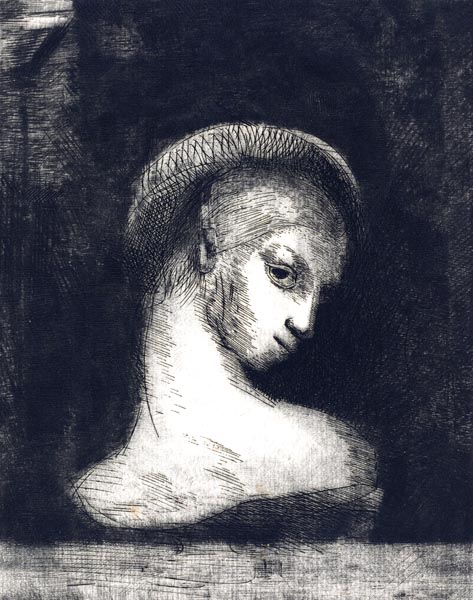
‘Perversity’
Odilon Redon (French, 1840 – 1916)
National Gallery of Art | NGA Images
Summer Sadness
The sun, on the sand, O sleeping wrestler,
Warms a languid bath in the gold of your hair,
Melting the incense on your hostile features,
Mixing an amorous liquid with the tears.
The immutable calm of this white burning,
O my fearful kisses, makes you say, sadly,
‘Will we ever be one mummified winding,
Under the ancient sands and palms so happy?’
But your tresses are a tepid river,
Where the soul that haunts us drowns, without a shiver
And finds the Nothingness you cannot know!
I’ll taste the unguent of your eyelids’ shore,
To see if it can grant to the heart, at your blow,
The insensibility of stones and the azure.
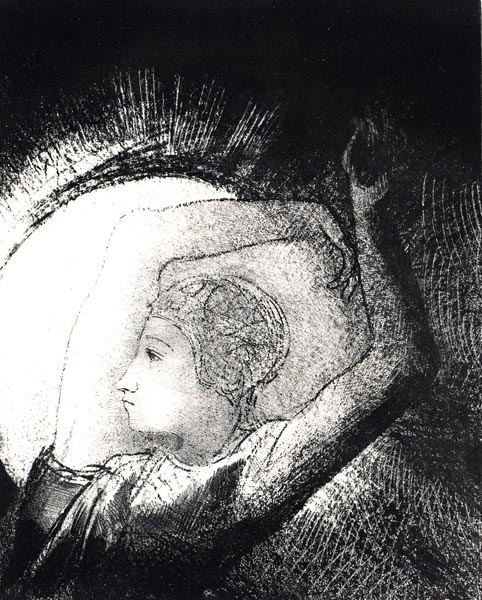
‘A woman clothed with the sun’
Odilon Redon (French, 1840 – 1916)
National Gallery of Art | NGA Images
The Clown Chastised
Eyes, lakes of my simple passion to be reborn
Other than as the actor who gestures with his hand
As with a pen, and evokes the foul soot of the lamps,
Here’s a window in the walls of cloth I’ve torn.
With legs and arms a limpid treacherous swimmer
With endless leaps, disowning the sickness
Hamlet! It’s as if I began to build in the ocean depths
A thousand tombs: to vanish still virgin there.
Mirthful gold of a cymbal beaten with fists,
The sun all at once strikes the pure nakedness
That breathed itself out of my coolness of nacre,
Rancid night of the skin, when you swept over me,
Not knowing, ungrateful one, that it was, this make-up,
My whole anointing, drowned in ice-water perfidy.
The Poem’s Gift
I bring you the child of an Idumean night!
Black, with pale naked bleeding wings, Light
Through the glass, burnished with gold and spice,
Through panes, still dismal, alas, and cold as ice,
Hurled itself, daybreak, against the angelic lamp.
Palm-leaves! And when it showed this relic, damp,
To that father attempting an inimical smile,
The solitude shuddered, azure, sterile.
O lullaby, with your daughter, and the innocence
Of your cold feet, greet a terrible new being:
A voice where harpsichords and viols linger,
Will you press that breast, with your withered finger,
From which Woman flows in Sibylline whiteness to
Those lips starved by the air’s virgin blue?
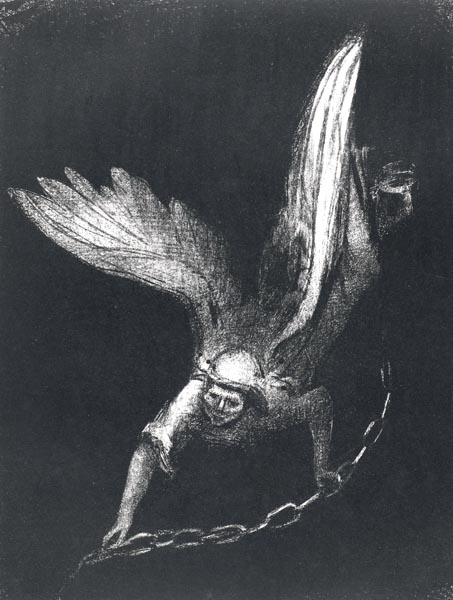
‘Angel with a chain in their hands’
Odilon Redon (French, 1840 – 1916)
The Rijksmuseum
L’Apres-midi d’un Faune
Eclogue
The Faun
These nymphs, I would perpetuate them.
So bright
Their crimson flesh that hovers there, light
In the air drowsy with dense slumbers.
Did I love a dream?
My doubt, mass of ancient night, ends extreme
In many a subtle branch, that remaining the true
Woods themselves, proves, alas, that I too
Offered myself, alone, as triumph, the false ideal of roses.
Let’s see….
or if those women you note
Reflect your fabulous senses’ desire!
Faun, illusion escapes from the blue eye,
Cold, like a fount of tears, of the most chaste:
But the other, she, all sighs, contrasts you say
Like a breeze of day warm on your fleece?
No! Through the swoon, heavy and motionless
Stifling with heat the cool morning’s struggles
No water, but that which my flute pours, murmurs
To the grove sprinkled with melodies: and the sole breeze
Out of the twin pipes, quick to breathe
Before it scatters the sound in an arid rain,
Is unstirred by any wrinkle of the horizon,
The visible breath, artificial and serene,
Of inspiration returning to heights unseen.
O Sicilian shores of a marshy calm
My vanity plunders vying with the sun,
Silent beneath scintillating flowers, RELATE
‘That I was cutting hollow reeds here tamed
By talent: when, on the green gold of distant
Verdure offering its vine to the fountains,
An animal whiteness undulates to rest:
And as a slow prelude in which the pipes exist
This flight of swans, no, of Naiads cower
Or plunge…’
Inert, all things burn in the tawny hour
Not seeing by what art there fled away together
Too much of hymen desired by one who seeks there
The natural A: then I’ll wake to the primal fever
Erect, alone, beneath the ancient flood, light’s power,
Lily! And the one among you all for artlessness.
Other than this sweet nothing shown by their lip, the kiss
That softly gives assurance of treachery,
My breast, virgin of proof, reveals the mystery
Of the bite from some illustrious tooth planted;
Let that go! Such the arcane chose for confidant,
The great twin reed we play under the azure ceiling,
That turning towards itself the cheek’s quivering,
Dreams, in a long solo, so we might amuse
The beauties round about by false notes that confuse
Between itself and our credulous singing;
And create as far as love can, modulating,
The vanishing, from the common dream of pure flank
Or back followed by my shuttered glances,
Of a sonorous, empty and monotonous line.
Try then, instrument of flights, O malign
Syrinx by the lake where you await me, to flower again!
I, proud of my murmur, intend to speak at length
Of goddesses: and with idolatrous paintings
Remove again from shadow their waists’ bindings:
So that when I’ve sucked the grapes’ brightness
To banish a regret done away with by my pretence,
Laughing, I raise the emptied stem to the summer’s sky
And breathing into those luminous skins, then I,
Desiring drunkenness, gaze through them till evening.
O nymphs, let’s rise again with many memories.
‘My eye, piercing the reeds, speared each immortal
Neck that drowns its burning in the water
With a cry of rage towards the forest sky;
And the splendid bath of hair slipped by
In brightness and shuddering, O jewels!
I rush there: when, at my feet, entwine (bruised
By the languor tasted in their being-two’s evil)
Girls sleeping in each other’s arms’ sole peril:
I seize them without untangling them and run
To this bank of roses wasting in the sun
All perfume, hated by the frivolous shade
Where our frolic should be like a vanished day.’
I adore you, wrath of virgins, O shy
Delight of the nude sacred burden that glides
Away to flee my fiery lip, drinking
The secret terrors of the flesh like quivering
Lightning: from the feet of the heartless one
To the heart of the timid, in a moment abandoned
By innocence wet with wild tears or less sad vapours.
‘Happy at conquering these treacherous fears
My crime’s to have parted the dishevelled tangle
Of kisses that the gods kept so well mingled:
For I’d scarcely begun to hide an ardent laugh
In one girl’s happy depths (holding back
With only a finger, so that her feathery candour
Might be tinted by the passion of her burning sister,
The little one, naïve and not even blushing)
Than from my arms, undone by vague dying,
This prey, forever ungrateful, frees itself and is gone,
Not pitying the sob with which I was still drunk.’
No matter! Others will lead me towards happiness
By the horns on my brow knotted with many a tress:
You know, my passion, how ripe and purple already
Every pomegranate bursts, murmuring with the bees:
And our blood, enamoured of what will seize it,
Flows for all the eternal swarm of desire yet.
At the hour when this wood with gold and ashes heaves
A feast’s excited among the extinguished leaves:
Etna! It’s on your slopes, visited by Venus
Setting in your lava her heels so artless,
When a sad slumber thunders where the flame burns low.
I hold the queen!
O certain punishment…
No, but the soul
Void of words, and this heavy body,
Succumb to noon’s proud silence slowly:
With no more ado, forgetting blasphemy, I
Must sleep, lying on the thirsty sand, and as I
Love, open my mouth to wine’s true constellation!
Farewell to you, both: I go to see the shadow you have become.
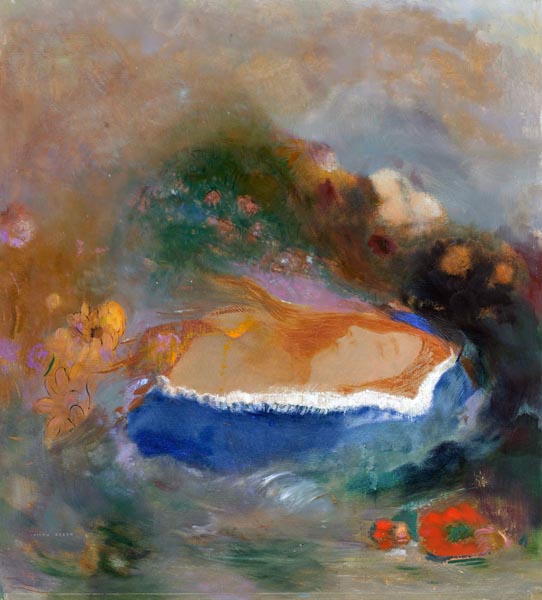
‘Ophelia, the blue cape on the waters’
Odilon Redon (French, 1840 – 1916)
The Rijksmuseum
Funeral Libation (At Gautier’s Tomb)
To you, gone emblem of our happiness!
Greetings, in pale libation and madness,
Don’t think to some hope of magic corridors I offer
My empty cup, where a monster of gold suffers!
Your apparition cannot satisfy me:
Since I myself entombed you in porphyry.
The rite decrees our hands must quench the torch
Against the iron mass of your tomb’s porch:
None at this simple ceremony should forget,
Those chosen to sing the absence of the poet,
That this monument encloses him entire.
Were it not that his art’s glory, full of fire
Till the dark communal moment all of ash,
Returns as proud evening’s glow lights the glass,
To the fires of the pure mortal sun!
Marvellous, total, solitary, so that one
Trembles to breathe with man’s false pride.
This haggard crowd! ‘We are’, it cries,
‘Our future ghosts, their sad opacity.’
But with walls blazoned, mourning, empty,
I’ve scorned the lucid horror of a tear,
When, deaf to the sacred verse he does not fear,
One of those passers-by, mute, blind, proud,
Transmutes himself, a guest in his vague shroud,
Into the virgin hero of posthumous waiting.
A vast void carried through the fog’s drifting,
By the angry wind of words he did not say,
Nothing, to this Man abolished yesterday:
‘What is Earth, O you, memories of horizons?’
Shrieks the dream: and, a voice whose clarity lessens,
Space, has for its toy this cry: ‘I do not know!’
The Master, with eye profound, as he goes,
Pacified the restless miracle of Eden,
Who alone woke, in his voice’s final frisson,
The mystery of a name for the Lily and the Rose.
Is there anything of this destiny left, or no?
O, all of you, forget your darkened faith.
Glorious, eternal genius has no shade.
I, moved by your desire, wish to see
for Him who vanished yesterday, in the Ideal
Work that for us the garden of this star creates,
As a solemn agitation in the air, that stays
Honouring this quiet disaster, a stir
Of words, a drunken red, calyx, clear,
That, rain and diamonds, the crystal gaze
Fixed on these flowers of which none fade,
Isolates in the hour and the light of day!
That’s all that’s left already of our true play,
Where the pure poet’s gesture, humble, vast
Must deny the dream, the enemy of his trust:
So that on the morning of his exalted stay,
When ancient death is for him as for Gautier,
The un-opening of sacred eyes, the being-still,
The solid tomb may rise, ornament this hill,
The sepulchre where lies the power to blight,
And miserly silence and the massive night.
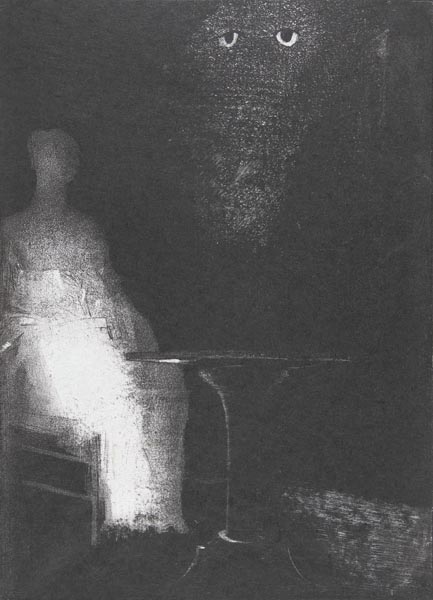
‘I look from above at the vague forms of a human figure’
Odilon Redon (French, 1840 – 1916)
The Rijksmuseum
The Tomb of Edgar Allan Poe
Such as eternity at last transforms into Himself,
The Poet rouses with two-edged naked sword,
His century terrified at having ignored
Death triumphant in so strange a voice!
They, like a spasm of the Hydra, hearing the angel
Once grant a purer sense to the words of the tribe,
Loudly proclaimed it a magic potion, imbibed
From some tidal brew black, and dishonourable.
If our imagination can carve no bas-relief
From hostile soil and cloud, O grief,
With which to deck Poe’s dazzling sepulchre,
Let your granite at least mark a boundary forever,
Calm block fallen here from some dark disaster,
To dark flights of Blasphemy scattered through the future.
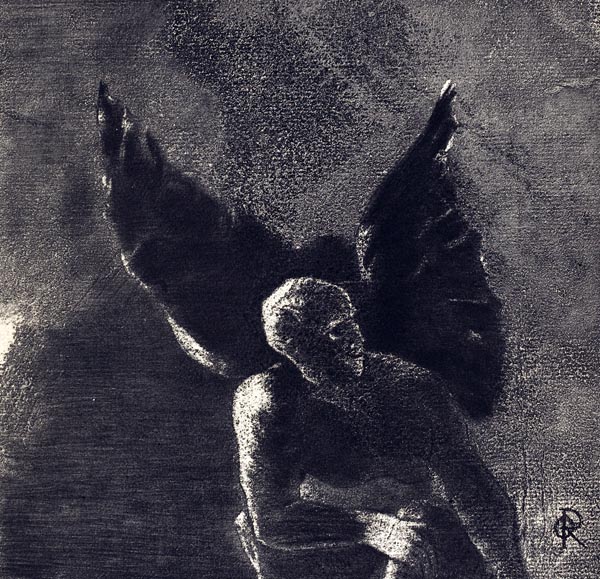
‘Glory and praise to you, Satan, in the heights of heaven’
Odilon Redon (French, 1840 – 1916)
National Gallery of Art | NGA Images
The Tomb of Charles Baudelaire
The buried shrine shows at its sewer-mouth’s
Sepulchral slobber of mud and rubies
Some abominable statue of Anubis,
The muzzle lit like a ferocious snout
Or as when a dubious wick twists in the new gas,
Wiping out, as we know, the insults suffered
Haggardly lighting an immortal pubis,
Whose flight roosts according to the lamp
What votive leaves, dried in cities without evening
Could bless, as she can, vainly sitting
Against the marble of Baudelaire
Shudderingly absent from the veil that clothes her
She, his Shade, a protective poisonous air
Always to be breathed, although we die of her.
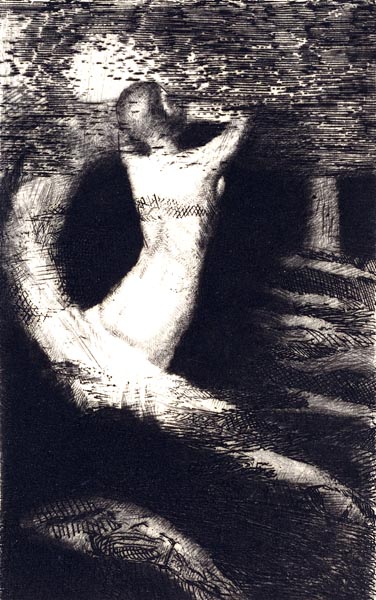
‘Passage of a Spirit’
Odilon Redon (French, 1840 – 1916)
National Gallery of Art | NGA Images
Tomb (Of Verlaine)
Anniversary – January 1897
The black rock enraged that the north wind rolls it on
Will not halt itself, even under pious hands, still
Testing its resemblance to human ill,
As if to bless some fatal cast of bronze.
Here nearly always if the ring-dove coos
This immaterial grief with many a fold of cloud
Crushes the ripe star of tomorrows, whose crowd
Will be silvered by its scintillations. Who
Following the solitary leap
External once of our vagabond – seeks
Verlaine? He’s hidden in the grass, Verlaine
Only to catch, naïvely, not drying with his breath
And without his lip drinking there, at peace again,
A shallow stream that’s slandered, and named Death.
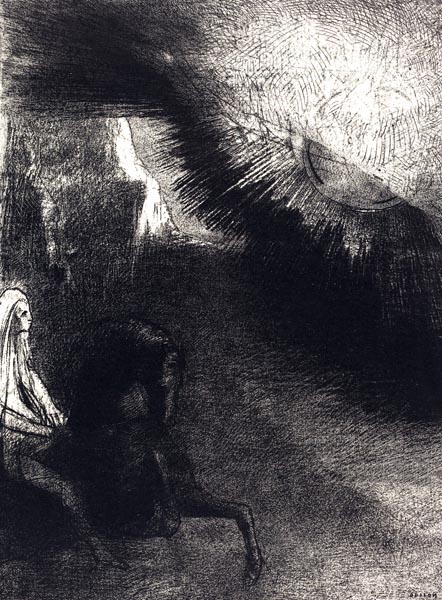
‘Pilgrim of the sublunary world’
Odilon Redon (French, 1840 – 1916)
National Gallery of Art | NGA Images
Prose
Hyperbole! From my memory
Triumphantly can’t you
Rise today, like sorcery
From an iron-bound book or two:
Since, through science, I inscribe
The hymn of hearts so spiritual
Through my patient work, inside
Atlas, herbal, ritual.
We walked, we set our face
(We were two, I maintain)
Towards the many charms of place,
Compared them, Sister, to yours again.
The reign of authority’s troubled
If, without reason, we say
Of this south that our double
Folly has in play
That its site, bed of a hundred irises,
(They know if it truly existed),
Bears no name the golden breath
Of the trumpet of Summer cited.
Yes, on an isle the air charges
With sight and not with visions
Every flower showed itself larger
Without entering our discussions.
Such flowers, immense, that every one
Usually had as adornment
A clear contour, a lacuna done
To separate it from the garden.
Glories of long-held desire, Ideas
Were all exalted in me, to see
The Iris family appear
Rising to this new duty,
But the sister sensible and fond
Carried her look no further
Than a smile, and as if to understand
I continue my ancient labour.
Oh! Let the contentious spirit know
At this hour when we are silent
The stalks of multiple lilies grow
Far too tall for our reason
And not as the riverbank weeps
When its tedious game tells lies
Claiming abundance should reach
Into my first surprise
On hearing the whole sky and the map
Behind my steps, without end, bear witness
By the ebbing wave itself that
This country never existed.
The child so taught by the paths,
Resigns her ecstasy
Says the word: Anastasius!
Born for scrolls of eternity,
Before a tomb can laugh
Beneath any sky, her ancestor,
At bearing that name: Pulcheria!
Hidden by the too-high lily-flower.
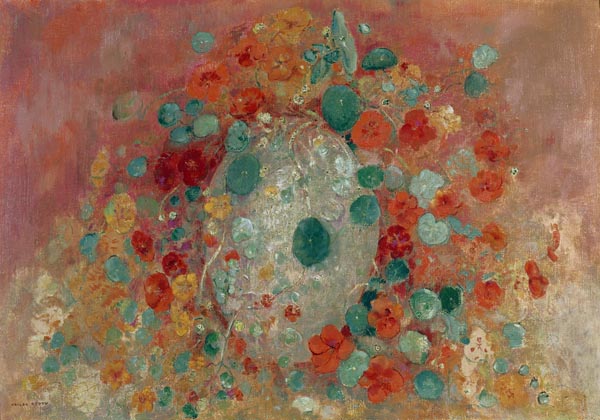
‘Nasturtiums’
Odilon Redon (French, 1840 – 1916)
Yale University Art Gallery
A Fan
Of Mademoiselle Mallarmé’s
With nothing of language but
A beating in the sky
From so precious a place yet
Future verse will rise.
A low wing the messenger
This fan if it is the one
The same by which behind you there
Some mirror has shone
Limpidly (where will fall
pursued grain by grain
a little invisible dust, all
that can give me pain)
So may it always bless
Your hands free of idleness.
Another Fan
Of Mademoiselle Mallarmé’s
O dreamer, that I may dive
In pure pathless joy, understand,
How by subtle deceits connive
To keep my wing in your hand.
A coolness of twilight takes
Its way to you at each beat
Whose imprisoned flutter makes
The horizon gently retreat.
Vertigo! How space quivers
Like an enormous kiss
That, wild to be born for no one, can neither
Burst out or be soothed like this.
Do you feel the fierce paradise
Like stifled laughter that slips
To the unanimous crease’s depths
From the corner of your lips?
The sceptre of shores of rose
Stagnant on golden nights,
Is this white closed flight that shows
Against your bracelet’s fiery light.
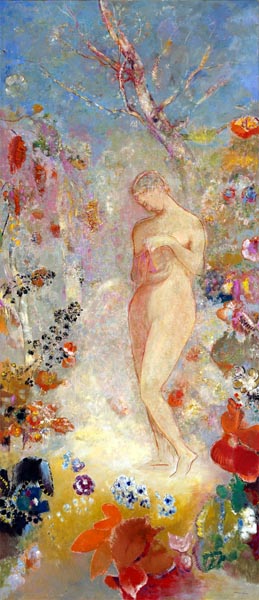
‘Pandora’
Odilon Redon (French, 1840 – 1916)
The Met
Album Leaf
All at once, as if in play,
Mademoiselle, she who moots
A wish to hear how it sounds today
The wood of my several flutes
It seems to me that this foray
Tried out here in a country place
Was better when I put them away
To look more closely at your face
Yes this vain whistling I suppress
In so far as I can create
Given my fingers pure distress
It lacks the means to imitate
Your very natural and clear
Childlike laughter that charms the air.
Note: Written to Mademoiselle Roumanille whom Mallarmé knew as a child.
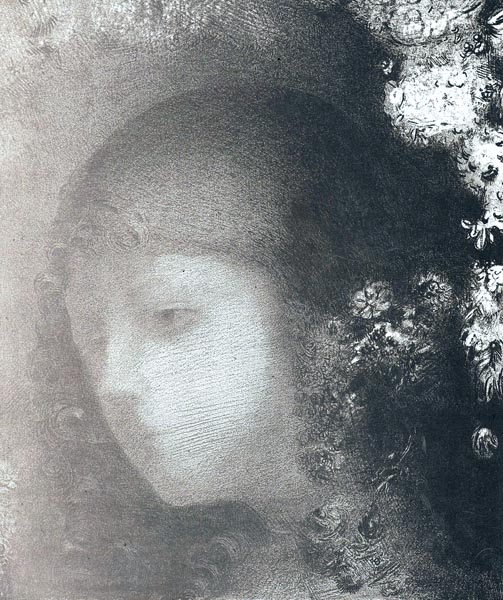
‘Child's head with flowers’
Odilon Redon (French, 1840 – 1916)
The Rijksmuseum
Note
Not meaningless flurries like
Those that frequent the street
Subject to black hats in flight;
But a dancer shown complete
A whirlwind of muslin or
A furious scattering of spray
Raised by her knee, she for
Whom we live, to blow away
All, beyond her, mundane
Witty, drunken, motionless,
With her tutu, and refrain
From other mark of distress,
Unless a light-hearted draught of air
From her dress fans Whistler there.
Little Air
I
Any solitude
Without a swan or quai
Mirrors its disuse
In the gaze I abdicate
Far from that pride’s excess
Too high to enfold
In which many a sky paints itself
With the twilight’s gold
But languorously flows beside
Like white linen laid aside
Such fleeting birds as dive
Exultantly at my side
Into the wave made you
Your exultation nude.
II
Unconquerably there must
As my hope hurls itself free
Burst on high and be lost
In silence and in fury
A voice alien to the wood
Or followed by no echo,
The bird one never could
Hear again in this life below.
The wild musician,
The one that in doubt expires
As to whether from his breast or mine
Has spurted the sob more dire
Torn apart may it complete
Find rest on some path beneath!
Sonnet: ‘Quand l’ombre menaça…’
When the shadow with fatal law menaced me
A certain old dream, sick desire of my spine,
Beneath funereal ceilings afflicted by dying
Folded its indubitable wing there within me.
Luxury, O ebony hall, where to tempt a king
Famous garlands are writhing in death,
You are only pride, shadows’ lying breath
For the eyes of a recluse dazed by believing.
Yes, I know that Earth in the depths of this night,
Casts a strange mystery with vast brilliant light
Beneath hideous centuries that darken it the less.
Space, like itself, whether denied or expanded
Revolves in this boredom, vile flames as witness
That a festive star’s genius has been enkindled.
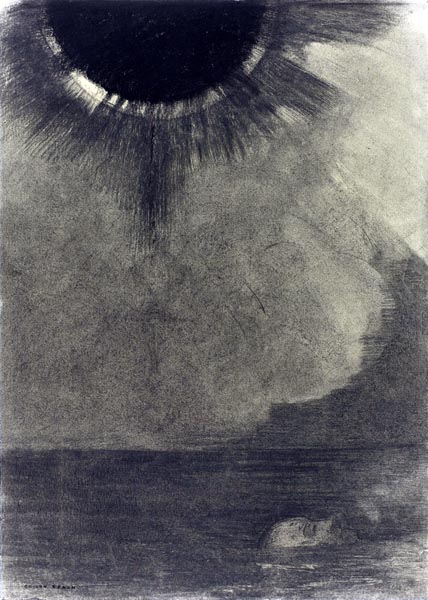
‘The Drowned’
Odilon Redon (French, 1840 – 1916)
The Rijksmuseum
Sonnet: ‘Le vierge, le vivace…’
The virginal, living and lovely day
Will it fracture for us with a wild wing-blow
This solid lost lake whose frost’s haunted below
By the glacier, transparent with flights not made?
A swan from time past remembers it’s he
Magnificent yet struggling hopelessly
Through not having sung a liveable country
From the radiant boredom of winter’s sterility.
His neck will shake off this whitest agony
Space inflicts on a bird that denies it wholly,
But not earth’s horror that entraps his feathers.
Phantom assigned to this place by his brilliance,
The Swan in his exile is rendered motionless,
Swathed uselessly by his cold dream of defiance.
Sonnet: ‘Victorieusement fui le suicide…’
Victoriously the grand suicide fled
Foaming blood, brand of glory, gold, tempest!
O laughter if only to royally invest
My absent tomb purple, down there, is spread.
What! Not even a fragment of all that brightness
Remains, it is midnight, in the shade that fetes us,
Except, from the head, there’s a treasure, presumptuous,
That pours without light its spoiled languidness,
Yours, always such a delight! Yours, yes,
Retaining alone of the vanished sky, this
Trace of childish triumph as you spread each tress,
Gleaming as you show it against the pillows,
Like the helmet of war of a child-empress
From which, to denote you, would pour down roses.
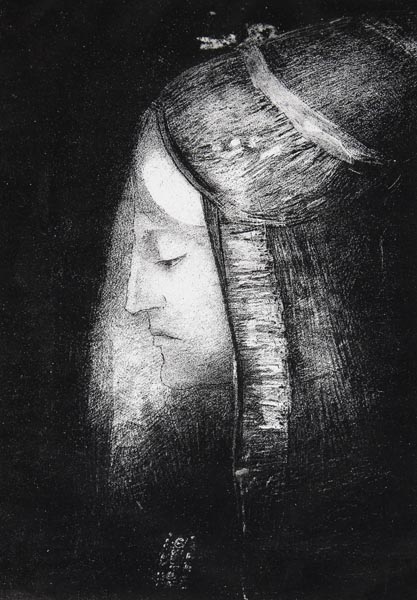
‘Profile of Light’
Odilon Redon (French, 1840 – 1916)
The Rijksmuseum
Sonnet: ‘Ses purs ongles très haut…’
Her pure nails on high dedicating their onyx,
Anguish, at midnight, supports, a lamp-holder,
Many a twilight dream burnt by the Phoenix
That won’t be gathered in some ashes’ amphora
On a table, in the empty room: here is no ptyx,
Abolished bauble of sonorous uselessness,
(Since the Master’s gone to draw tears from the Styx
With that sole object, vanity of Nothingness).
But near the casement wide to the north,
A gold is dying, in accord with the décor
Perhaps, those unicorns dashing fire at a nixie,
She who, naked and dead in the mirror, yet
In the oblivion enclosed by the frame, is fixed
As soon by scintillations as the septet.
Note: The septet may indicate the constellation of Ursa Major in the north.
Sonnet: ‘Pour votre chère morte, son ami…’
For your dear departed wife, his friend 2 November 1877
– ‘Over the lost woods when dark winter lowers
You moan, O solitary captive of the threshold,
That this double tomb which our pride should hold’s
Cluttered, alas, only with absent weight of flowers.
Unheard Midnight counts out his empty number,
Wakefulness urges you never to close an eye,
Before in the ancient armchair’s embrace my
Shade is illuminated by the dying embers.
Who wishes to receive visitations often,
Mustn’t load with too many flowers the stone
My finger raises with a dead power’s boredom.
A soul trembling to sit by a hearth so bright,
To exist again, it’s enough if I borrow from
Your lips the breath of my name you murmur all night.’
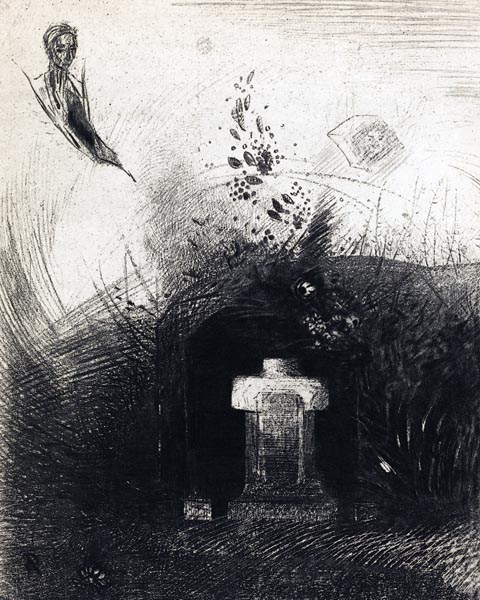
‘If on a close dark night...’
Odilon Redon (French, 1840 – 1916)
The Rijksmuseum
To The Sole Concern
To the sole task of voyaging
Beyond an India dark and splendid
– Goes time’s messenger, this greeting,
Cape that your stern has doubled
As on some low yard plunging
Along with the vessel riding
Skimmed in constant frolicking
A bird bringing fresh tidings
That without the helm flickering
Shrieked in pure monotones
An utterly useless bearing
Night, despair, and precious stones
Reflected by its singing so
To the smile of pale Vasco.
All Summarised The Soul…
All summarised, the soul,
When slowly we breathe it out
In several rings of smoke
By other rings wiped out
Bears witness to some cigar
Burning skilfully while
The ash is separated far
From its bright kiss of fire
Should the choir of romantic art
Fly so towards your lips
Exclude from it if you start
The real because it’s cheap
Meaning too precise is sure
To void your dreamy literature.
What Silk…
What silk of time’s sweet balm
Where the Chimera tires himself
Is worth the coils and natural cloud
You tend before the mirror’s calm?
The blanks of meditating flags
Stand high along our avenue:
But I’ve your naked tresses too
To bury there my contented eyes.
No! The mouth cannot be sure
Of tasting anything in its bite
Unless your princely lover cares
In that mighty brush of hair
To breathe out, like a diamond,
The cry of Glory stifled there.
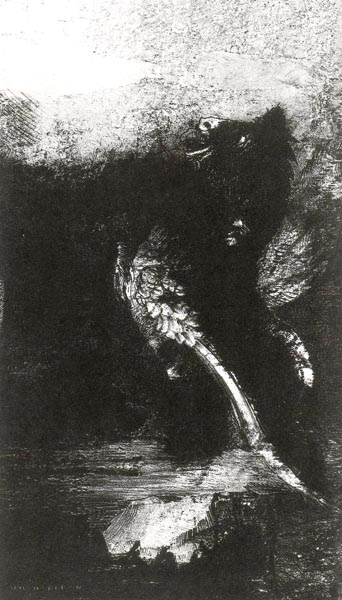
‘The chimera with green eyes’
Odilon Redon (French, 1840 – 1916)
The Rijksmuseum
To Introduce Myself…
To introduce myself to your story
It’s as the frightened hero
If he touched with naked toe
A blade of territory
Prejudicial to glaciers I
Know of no sin’s naivety
Whose loud laugh of victory
You won’t have then denied
Say if I’m not filled with joyousness
Thunder and rubies to the hubs no less
To see in the air this fire is piercing
With royal kingdoms far scattering,
The wheel, crimson, as if in dying,
Of my chariot’s single evening.
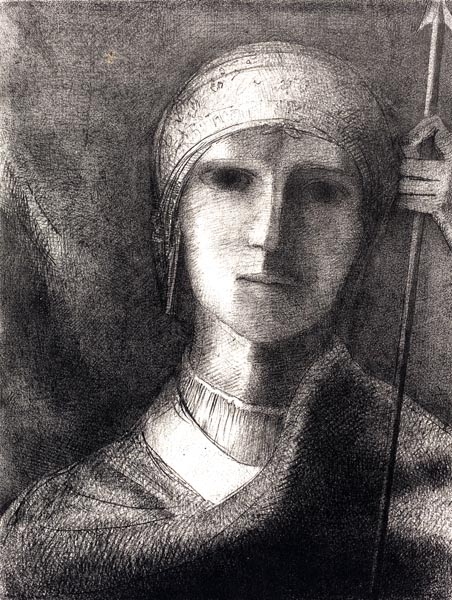
‘Parsifal’
Odilon Redon (French, 1840 – 1916)
The Rijksmuseum
Crushed by….
Crushed by the overwhelming cloud
Depth of basalt and lavas
By even the enslaved echoes
Of a trumpet without power
What sepulchral shipwreck (you
Know it, slobbering there, foam)
Among hulks the supreme one
Flattened the naked mast too
Or that which, furious mistake
Of some noble ill-fate
All the vain abyss spread wide
In the so-white hair’s trailing
Would have drowned miser-like
The childish flank of some Siren.
My Books…
My books closed again on Paphos’ name,
It delights me to choose with solitary genius
A ruin, by foam-flecks in thousands blessed
Beneath hyacinth, far off, in days of fame.
Let the cold flow with its silence of scythes,
I’ll not ululate here in a ‘no’ that’s empty
If this frolic so white near the ground denies
To each site the honour of false scenery.
My hunger regaled by no fruits here I see
Finds equal taste in their learned deficiency:
Let one burst with human fragrance and flesh!
While my love pokes the fire, foot on cold iron
I brood for a long time perhaps with distress
On the other’s seared breast of an ancient Amazon.
Sigh
My soul, towards your brow where O calm sister,
An autumn dreams, blotched by reddish smudges,
And towards the errant sky of your angelic eye
Climbs: as in a melancholy garden the true sigh
Of a white jet of water towards the Azure!
– To the Azure that October stirred, pale, pure,
That in the vast pools mirrors infinite languor,
And over dead water, where the leaves wander
The wind, in russet throes, dig their cold furrow,
Allows a long ray of yellow light to flow.
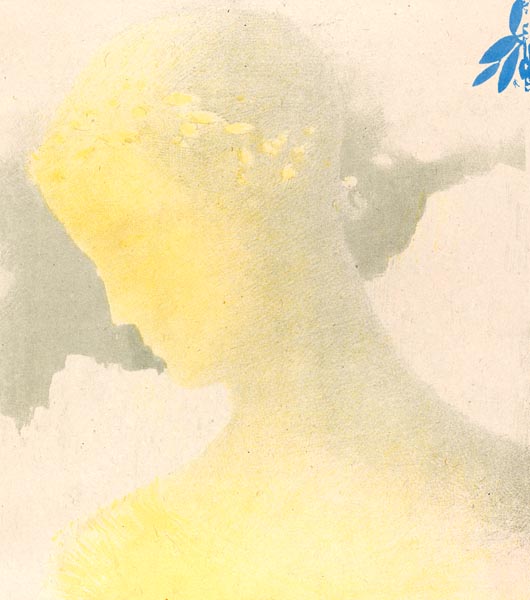
‘Beatrice’
Odilon Redon (French, 1840 – 1916)
National Gallery of Art | NGA Images
Homage
Each Dawn however numb
To raise a fist obscure
Against trumpets of azure
Sounded by her, the dumb,
Has the shepherd with his gourd
Joined to a rod struck harshly
Along the path to be
Till the vast stream’s outpoured
Already thus solitary
You live O Puvis
De Chavannes
never alone
Lead our age to quench its thirst
From the shroud-less nymph, the one
Whom your glory will rehearse
…Mysticis umbraculis
She slept: her finger trembled, amethyst-less
And naked, under her nightdress:
After a deep sigh, ceased, cambric raised to her waist.
And her belly seemed of snow on which might rest,
If a ray of light re-gilded the forest,
A bright goldfinch’s mossy nest.
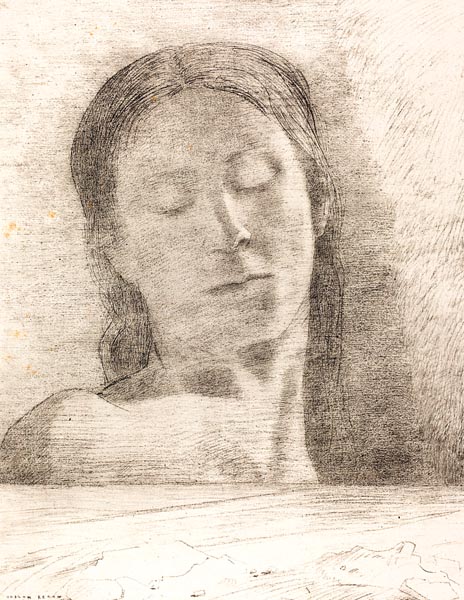
‘Closed Eyes’
Odilon Redon (French, 1840 – 1916)
National Gallery of Art | NGA Images
Fan
Of Méry Laurent
Frigid roses to last
Identically will interrupt
With a calyx, white, abrupt,
Your breath become frost
But freed by my fluttering
By shock profound, the sheaf
Of frigidity melts to relief
Of laughter’s rapturous flowering.
In carving out the sky
Like a fine fan you ply
Outdoing that phial’s glass
Without loss or violation
Unable to hold fast
Méry’s sweet emanation.
O so dear
O so dear from far and near and white all
So deliciously you, Méry, that I dream
Of what impossibly flows, of some rare balm
Over some flower-vase of darkened crystal.
Do you know it, yes! For me, for years, here,
Forever, your dazzling smile prolongs
The one rose with its perfect summer gone
Into times past, yet then on into the future.
My heart that sometimes at night tries to confer,
Or name you most tender with whatever last word
Rejoices in that which whispers none but sister –
Were it not, such short tresses so great a treasure,
That you teach me a sweetness, quite other,
Soft through the kiss murmured only in your hair.
Note: Dated 1895. This being one of the series of poems written for Méry Laurent, a friend also of Manet and others.
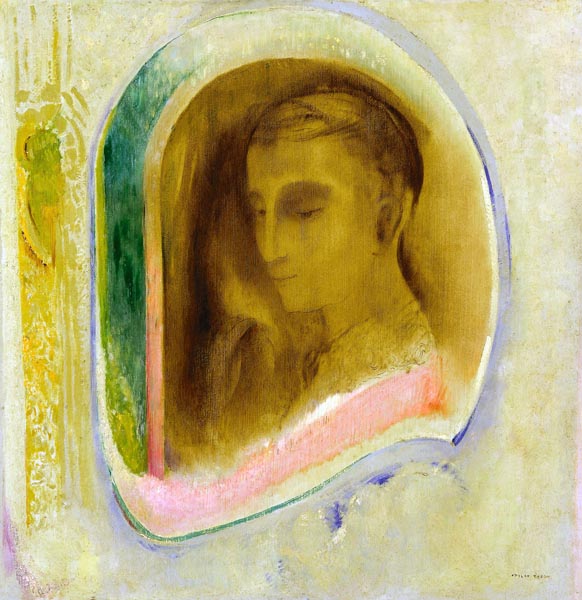
‘Silence’
Odilon Redon (French, 1840 – 1916)
Minneapolis Institute of Art
Sonnet
Méry, sans trop d’aurore…)
Méry,
Without dawn too grossly now inflaming
The rose, that splendid, natural and weary
Sheds even her heavy veil of perfumes to hear
Beneath the flesh the diamond weeping,
Yes, without those dewy crises! And gently,
Unbroken when the sky fills with storm,
Jealous to add who knows what spaces
To simple day the day so true in feeling,
Does it not seem, Méry, that each year,
Where spontaneous grace relights your brow,
Suffices, in so many aspects and for me,
Like a lone fan with which a room’s surprised,
To refresh with as little pain as is needed here
All our inborn and unvarying friendship.
Autumn Plaint
Since Maria left me to go to another star - which one, Orion, Altair - or you green Venus? - I have always loved solitude. How many long days I have passed alone with my cat. By alone I mean without a material being, and my cat is a mystic companion, a spirit. I can say then that I have passed long days alone with my cat and alone with one of the last authors of the Roman decadence; for since the white creature is no more I have loved, uniquely and strangely, everything summed up in the word: fall. So, in the year, my favourite season is the last slow part of summer that just precedes autumn, and, in the day, the hour when I walk is when the sun hesitates before vanishing, with rays of yellow bronze over the grey walls, and rays of red copper over the tiles. Literature, also, from which my spirit asks voluptuousness, that will be the agonised poetry of Rome’s last moments, so long as it does not breathe a breath of the reinvigorated stance of the Barbarians or stammer in childish Latin like Christian prose. I was reading then one of those dear poems (whose flakes of rouge have more charm for me than young flesh), and dipping a hand into the pure animal fur, when a street organ sounded languishingly and sadly under my window. It was playing in the great alley of poplars whose leaves, even in spring, seem mournful to me since Maria passed by them, on her last journey, lying among candles. The instrument of sadnesses, yes, certainly: the piano flashes, the violin gives off light from its torn fibres, but the street organ in memory’s half-light made me dream despairingly. Now it murmured a delightfully common song that filled the faubourgs with joy, an old, banal tune: why did its words pierce my soul and make me cry, like any romantic ballad? I savoured it slowly and did not throw a coin through the window for fear of troubling my spirit and discovering that not only the instrument was playing.
Sea Breeze
The flesh is sad, alas! – and I’ve read all the books.
Let’s go! Far off. Let’s go! I sense
That the birds, intoxicated, fly
Deep into unknown spume and sky!
Nothing – not even old gardens mirrored by eyes –
Can restrain this heart that drenches itself in the sea,
O nights, or the abandoned light of my lamp,
On the void of paper, that whiteness defends,
No, not even the young woman feeding her child.
I shall go! Steamer, straining at your ropes
Lift your anchor towards an exotic rawness!
A Boredom, made desolate by cruel hope
Still believes in the last goodbye of handkerchiefs!
And perhaps the masts, inviting lightning,
Are those the gale bends over shipwrecks,
Lost, without masts, without masts, no fertile islands...
But, oh my heart, listen to the sailors’ chant!
Stéphane Mallarmé (1842-1898) was born in Paris. He was strongly affected by the early deaths of his mother, and younger sister, and later by that of his father. After learning English in London in 1862/3, he worked for most of his life as an English teacher, at first in the provinces and later in Paris. Mallarmé was relatively poor, but became noted for his literary salons on the rue de Rome, which were a centre of Parisian intellectual life, and with which he greatly influenced the literary direction of his time, through his poetry, his criticism, and his poetic theory, despite his relatively limited output. Of his two children, his son Anatole died sadly young. He himself died at Valvins, on the Seine near Fontainebleau, the location of his holiday home and retirement residence.
Index of First Lines
- Nothing, this foam, virgin verse
- Princess! To be jealous of a Hebe’s fate
- Possessed by some demon now a negress
- I don’t come to conquer your flesh tonight, O beast
- The sun, on the sand, O sleeping wrestler,
- Eyes, lakes of my simple passion to be reborn
- I bring you the child of an Idumean night!
- These nymphs, I would perpetuate them.
- To you, gone emblem of our happiness!
- Such as eternity at last transforms into Himself,
- The buried shrine shows at its sewer-mouth’s
- The black rock enraged that the north wind rolls it on
- Hyperbole! From my memory
- With nothing of language but
- O dreamer, that I may dive
- All at once, as if in play,
- Not meaningless flurries like
- Any solitude
- When the shadow with fatal law menaced me
- The virginal, living and lovely day
- Victoriously the grand suicide fled
- Her pure nails on high dedicating their onyx,
- – ‘Over the lost woods when dark winter lowers
- To the sole task of voyaging
- All summarised, the soul,
- What silk of time’s sweet balm
- To introduce myself to your story
- Crushed by the overwhelming cloud
- My books closed again on Paphos’ name,
- My soul, towards your brow where O calm sister,
- Each Dawn however numb
- She slept: her finger trembled, amethyst-less
- Frigid roses to last
- O so dear from far and near and white all
- Méry,
- Since Maria left me to go to another star - which one, Orion, Altair - or you
- The flesh is sad, alas! – and I’ve read all the books.